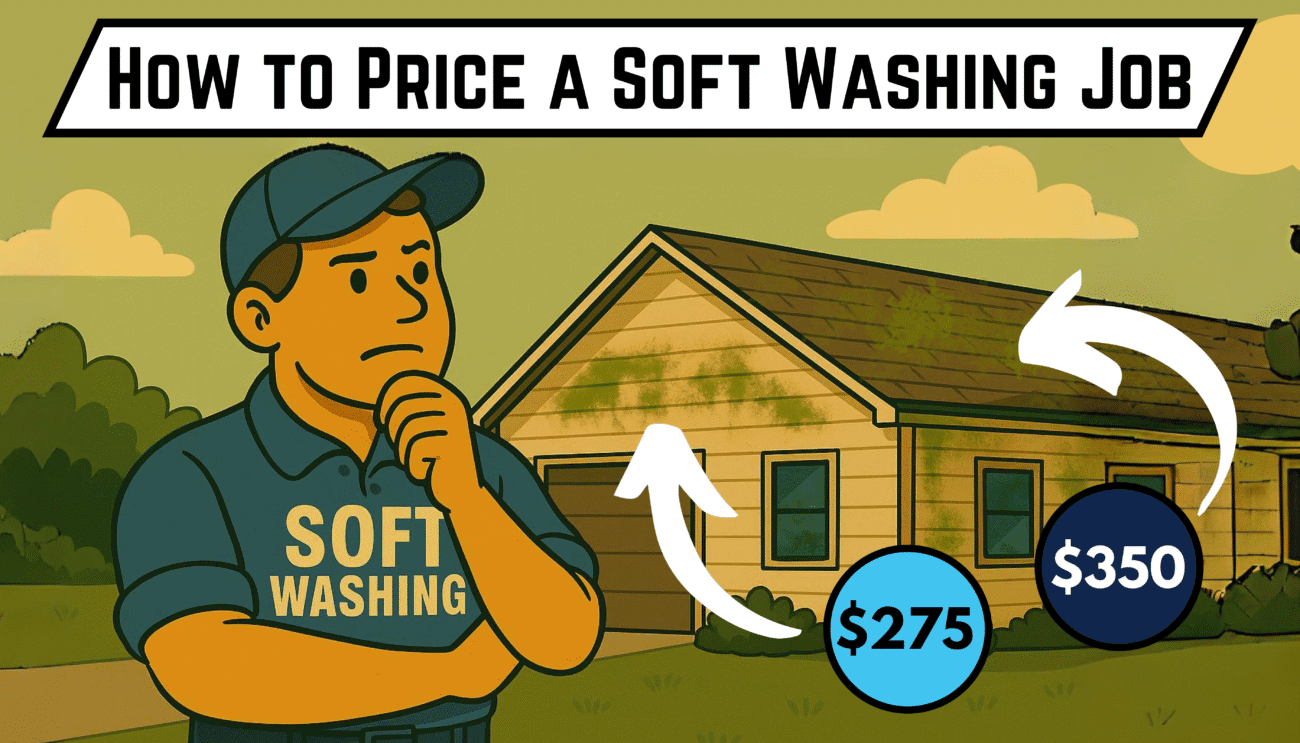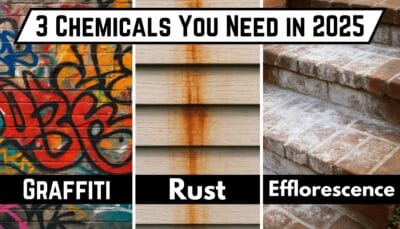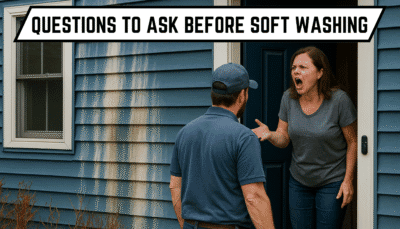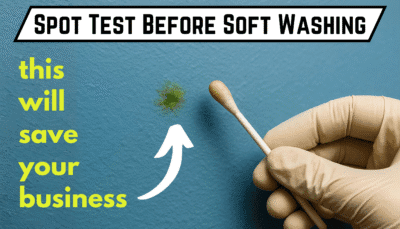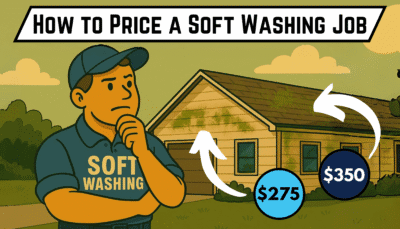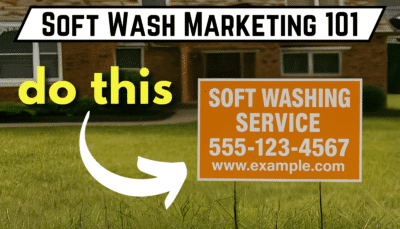Before we get to crunching numbers and pricing out soft washing jobs, it’s important we understand some fundamentals about selling and consumer psychology.
1. Simple Selling Method
If you are constantly trying to be the cheapest option on the market, it’s going to be tough to grow your business. Instead focus your efforts on selling the value of working with your company.
Emphasize the following when messaging to prospects:
- What do you offer that your competitors don’t?
- Why are you worth more than the guy who is willing to do the job for $99?
- Why can I trust you? (Social proof, Google reviews, years in business)
Customer service, big smiles, and a positive attitude go a long way in every industry. Remember, you aren’t just selling your service, you are selling you. Carry yourself with authority. Shoulders back, walk with confidence and give a firm handshake.
Say your price with confidence and know that you are worth it.
Assume the sale
Always assume the sale after giving your price. Say something like, “The total for your job comes out to $785 – minus your military discount – I’ve got you down to $700 even. We have a slot open tomorrow at 9 A.M. or Tuesday at 11 A.M. What time should I put you down for?”
In this example, we didn’t ask the customer if they wanted to buy our service. We assume the sale and ask a “button up” question that has the customer focus on how they will consume our service, not if they will consume our service. This simple selling method projects confidence in your product, and people buy confidence.
Never Give Free Discounts
Always be prepared for price objections. This is the most common objection you will deal with in your selling career. A price objection is simply the customer telling you your price is too high.
Imagine I’m trying to sell you a car and I tell you the price is $30,000. You respond by saying you can’t afford that. Then I say, “Okay, okay — I’ll sell it to you for $27,000 instead.”
Why the sudden decrease in price?? Did the car just magically lose $3,000 in value!?
When you give a price to a customer, there is often some wiggle room wherein you can afford to give them a discount if they say you are too expensive. But this discount can’t magically appear out of nowhere. Since you are not willing to compromise on the quality of your work, there has to be another reason you are able to extend this discount.
Can the customer:
- Refer 3 friends or family members?
- Leave your yard sign out for a week after cleaning?
- Leave you a Google review or follow you on Facebook?
“In that case Mr. Smith – since you are willing to help us grow our social media – I can give you 10% off of your service bringing the total job cost down to $680. Would you like us to start on the roof or driveway first?”
When we ask the customer for something in return, the discount actually has value because they have to work for it.
When using this strategy you want to price the job slightly higher than what you are willing to do it for. That way if you get a price objection from your customer you have some room for a justified discount. The great thing about this method is sometimes the customer will hear your initial price and simply say yes.
The moral of the story:
- Price high and communicate value
2. Leave some wiggle room to handle price objections
3. Always justify a discount by asking for something in return
2. Know Your Costs First

Before you give anyone a quote, you’ve got to know how much the job will actually cost you. Here’s what to think about:
- Chemicals like bleach and surfactants
- Gas to get to and from the job
- Labor if you have helpers or subcontractors
- Business costs like insurance, software, website fees, and taxes
If you skip this step, you’re just hoping you’ll make a profit. And hoping isn’t a strategy.
3. What Affects Your Pricing?
No two jobs are the same, so you need to look at the details. Here’s what matters:
- Size of the job in square feet.
- Surface type like vinyl, stucco, wood, metal, etc.
- Stain level such as light dirt or heavy algae and mold.
- Accessibility like second floors, steep roofs, or tight spaces.
- Travel time if the job is far from you.
- Your minimum fee so even small jobs are worth your time.
- Local competition because if there are ten other guys in your area offering the same service, you’ll need to price smart and stand out with value or speed.
These things help you figure out how much time, effort, and materials the job will really take and what price actually makes sense.
4. Build a Smart Pricing System

There are two ways to price a job: flat rate or per square foot. Most guys use a mix of both, depending on the job size and how they like to work. Even if you price based on square footage, have a minimum price that covers fixed costs. $300-$400 ish
Flat rate means you charge one set price for the whole job. It’s quick and simple.
For example:
- A 2,000 square foot shingle roof might run between $400 and $700.
- A 1,000 square foot vinyl siding job might be around $300 to $450.
(These are ballpark figures and can vary depending on your location, surface condition, and other factors mentioned in Section 2 of this article.)
Per square foot means you measure the job and charge based on size. It takes a little more math but helps you stay profitable, especially on bigger jobs.
Here is a cool tool you can use to measure and quote remotely:
Map Area Calculator – Marea
A free app that helps you measure square footage remotely using map coordinates.
➡ Download for iOS
➡ Download for Android
Your location and level of competition will make a big difference when pricing your jobs. For instance, here in South Florida where soft washing is common, my buddies are typically pricing their jobs between $0.12 and $0.20 per square foot. This is relatively low compared to other states where soft washing is less common and less competitive.
During our research, we found that – in some states like Pennsylvania and California – service providers were charging as much as $0.60 to $0.80 per square foot for soft washing.
A sneaky way to figure out your pricing is to find a 2000 square foot house near you and contact a couple local soft wash companies requesting a quote. Take the price of their quote and divide it by 2000 to determine the range of rates in your area.
Want to make quoting easier? Use the calculator below to get a quick estimate based on your rate and the square footage you’re working with.
Soft Washing Quote Calculator
*Disclaimer: This tool is for estimate purposes only. Final pricing may vary depending on surface condition, access, location, and other job-specific details.
If you want to hone the art of selling and communication, check out the resources below:
➡ How to Win Friends and Influence People
(As an Amazon Associate, we earn from qualifying purchases.)


